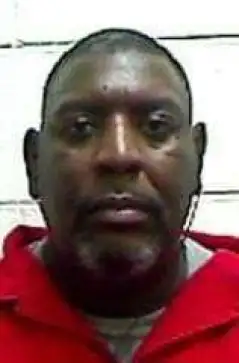Andre Fletcher was sentenced to death by the State of North Carolina for the murder of Georgia Ann Dayberry Hamrick
According to court documents Andre Fletcher would break into the home of 83 year old Georgia Ann Dayberry Hamrick. The woman would be beaten and stabbed to death
Andre Fletcher would be arrested, convicted and sentenced to death
Andre Fletcher Photos

Andre Fletcher FAQ
Where Is Andre Fletcher Now
Andre Fletcher is incarcerated at Central Prison
Andre Fletcher Case
On 17 August 1994 during a rainstorm, eighty-three year old Georgia Ann Dayberry Hamrick (“victim”) was beaten and knifed to death in her home in Spindale, Rutherford County, North Carolina. The State’s evidence tended to show that defendant broke into the victim’s home, beat her to coerce her into disclosing the location of valuables, and then cut her throat. Defendant stole a number of rings, two of which he and his girlfriend, Lisa Hill, sold. The police recovered additional rings belonging to the victim at the places defendant said he had put them.
At his first trial and sentencing hearing, defendant did not testify but presented evidence tending to show that a man wearing a yellow raincoat who was seen in the neighborhood by several witnesses that evening committed the crime but was never found or identified by the police. Defendant’s defense was that the evidence linking him to the burglary and murder was insufficient.
At the resentencing hearing defendant testified that he met Lisa Hill in 1994, when defendant was twenty years old and Hill was thirty-four years old. Defendant moved into Hill’s home, located near the victim’s home, a couple of months before the killing. On the night of the murder, defendant and Hill were at home smoking marijuana mixed with cocaine. They began arguing when defendant refused to give more drugs to Hill, explaining that “you can’t do drugs and sell drugs, too, and make a profit.” Defendant told Hill he was going to the store for cigarettes, and Hill followed.
Hill continued asking for drugs, whereupon defendant told her, “You got to go out and get your own money however you want to do it if you want to support your habit.” Hill then suggested that they break into a house. Hill and defendant approached the victim’s house; and when no one responded to the doorbell, defendant tried to pull the storm door open. Defendant broke the glass in the storm door, then kicked in the wooden door. Once defendant and Hill entered the house, defendant noticed some movement and realized that the victim was in the house. Hill then went around defendant and began hitting the victim with a brass duck. Defendant took the brass duck away from Hill, ran out the back door, and threw it into a field behind the house. When defendant returned to the house, he discovered Hill “poking at” the victim with a knife. Defendant took the knife away from Hill, broke it in half by stepping on it, then ran away. Defendant began drinking when he returned home; Hill returned home some time later.
The next morning defendant and Hill went to a jewelry store to have a ring in Hill’s possession appraised. Hill refused to tell defendant how she obtained the ring. At Hill’s suggestion on the way home, they drove by the victim’s house, where they were stopped and questioned by police officers. Hill subsequently allowed the officers to seize the car in order to perform a luminol examination. Once the officers left with Hill’s car, defendant again asked Hill about the ring. Hill removed the ring from her bra and asked defendant where she could sell the ring. Defendant suggested a jeweler in Forest City, and they walked to a nearby store to call a cab. When Hill exited the store, she told defendant that she had wrapped some of the jewelry in a paper towel and hidden it in the store’s rest room. Once they arrived in Forest City, defendant began to understand where the rings had come from and told Hill not to sell them. Hill stated that the rings were hers and that she could do with them as she pleased. Defendant became angry and walked home.
Police officers were searching the home when defendant returned, and defendant noticed Hill smoking crack while officers were present in the room. Defendant admitted that he owned the wet clothing officers discovered and that he had worn those clothes the night of the murder. After the police officers left the house, defendant borrowed his sister’s car to drive Hill to a pawn shop. When they arrived Hill entered the pawn shop alone, then returned to the car. After defendant drove Hill to a location where she purchased drugs, they returned the car to defendant’s sister and walked home. As defendant and Hill were walking home, defendant suggested that Hill dispose of the remaining jewelry. Hill agreed and hid the remaining rings behind a building.
Later that evening defendant went to the store alone. When he returned home, he was arrested on an unrelated charge of breaking and entering a motor vehicle. Defendant was questioned about the murder when he was in jail for this other charge. Defendant did not want to “point the finger” at himself or Hill, but he eventually told officers where the rings were located in a manner intended to avoid incriminating anyone. Defendant did not tell anyone about his involvement in the murder until a year later, shortly before the trial, when he attempted to tell his mother.
Defendant further testified that he accepts responsibility for the murder because he kicked in the door and could have done more to stop the murder from occurring. Defendant stated that he did not intend to kill anyone and did not know that anyone was home when he broke into the victim’s house.
Defendant also presented testimony from a juvenile court counselor, two camp counselors, an investigator with the Department of Social Services, and defendant’s sister and aunt that showed that defendant had a history of theft but was not a violent or aggressive person. Defendant’s sister also testified that defendant’s father denied paternity of defendant, and would leave defendant behind when he picked up the other children for a visit.
Dr. Anthony Sciara, an expert in clinical psychology, testified that defendant has an IQ of 88, suffers from depression and a coping deficit, and responds hastily without adequate information. Dr. Sciara did not find indications that defendant would tend to be aggressive and noted that defendant has a passive personality that leads him to follow what other people tell him. The doctor further testified that defendant’s substance abuse began around the age of seven or eight.
Additional facts will be presented as necessary to discuss specific issues.
https://caselaw.findlaw.com/court/nc-supreme-court/1231201.html








